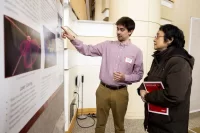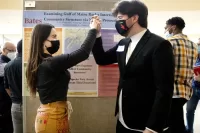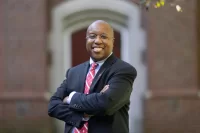
Mount David Summit is all grown up — this year’s event was the 21st edition of the annual academic party held in Pettengill Hall, centered in Perry Atrium.
Here’s what we saw and heard on the afternoon of March 31, 2023, from student presenters, including a number of seniors presenting their thesis research — with gusto — to friends, professors, staff members, family members, alumni, and other guests.
1:26 p.m. Just the essentials
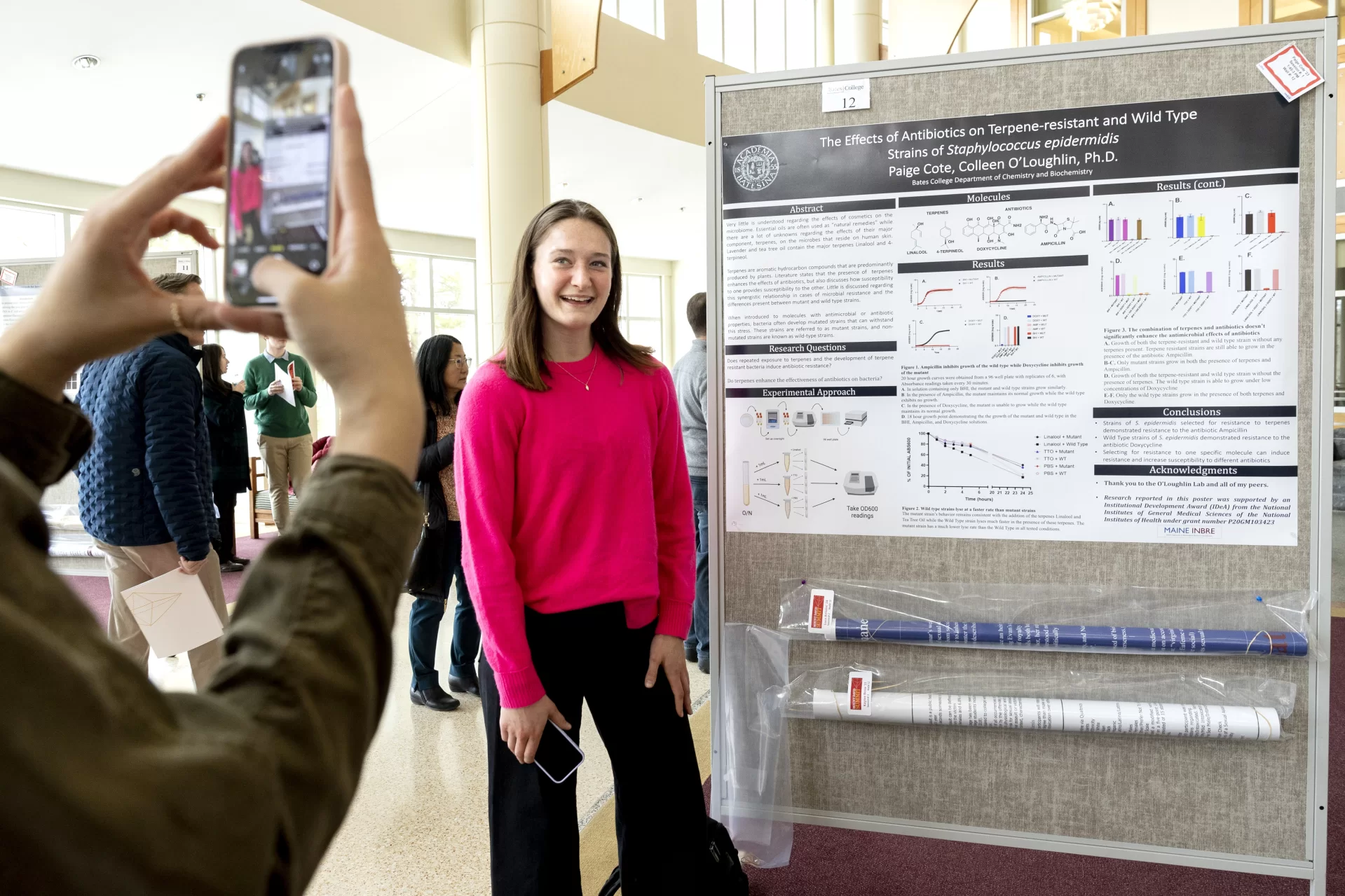
In Perry Atrium, the few minutes before Mount David Summit kicks off is prime time for photographs.
Paige Cote ’23 of New Gloucester, Maine, a biological chemistry major, poses with her thesis research poster, “Effects of Antibiotics on Terpene-Resistant and Wild Type Strains of Staphylococcus epidermidis.”
Terpenes are found in essential oils, which “are are often used as ‘natural remedies,’ though there are a lot of unknowns regarding the effect of terpenes on the microbes that naturally reside on human skin,” says Cote, including the bacterium Staphylococcus epidermidis.
Her thesis was advised by Colleen O’Loughlin, an assistant professor of chemistry and biochemistry.
1:32 p.m. Genetically focused
Esther Pincate ’23 of Gurnee, Ill., a double major in Spanish and biological chemistry, talks about her poster, “Genetic Normalization of TCF4 Gene for Treatment of Pitt-Hopkins Syndrome.”
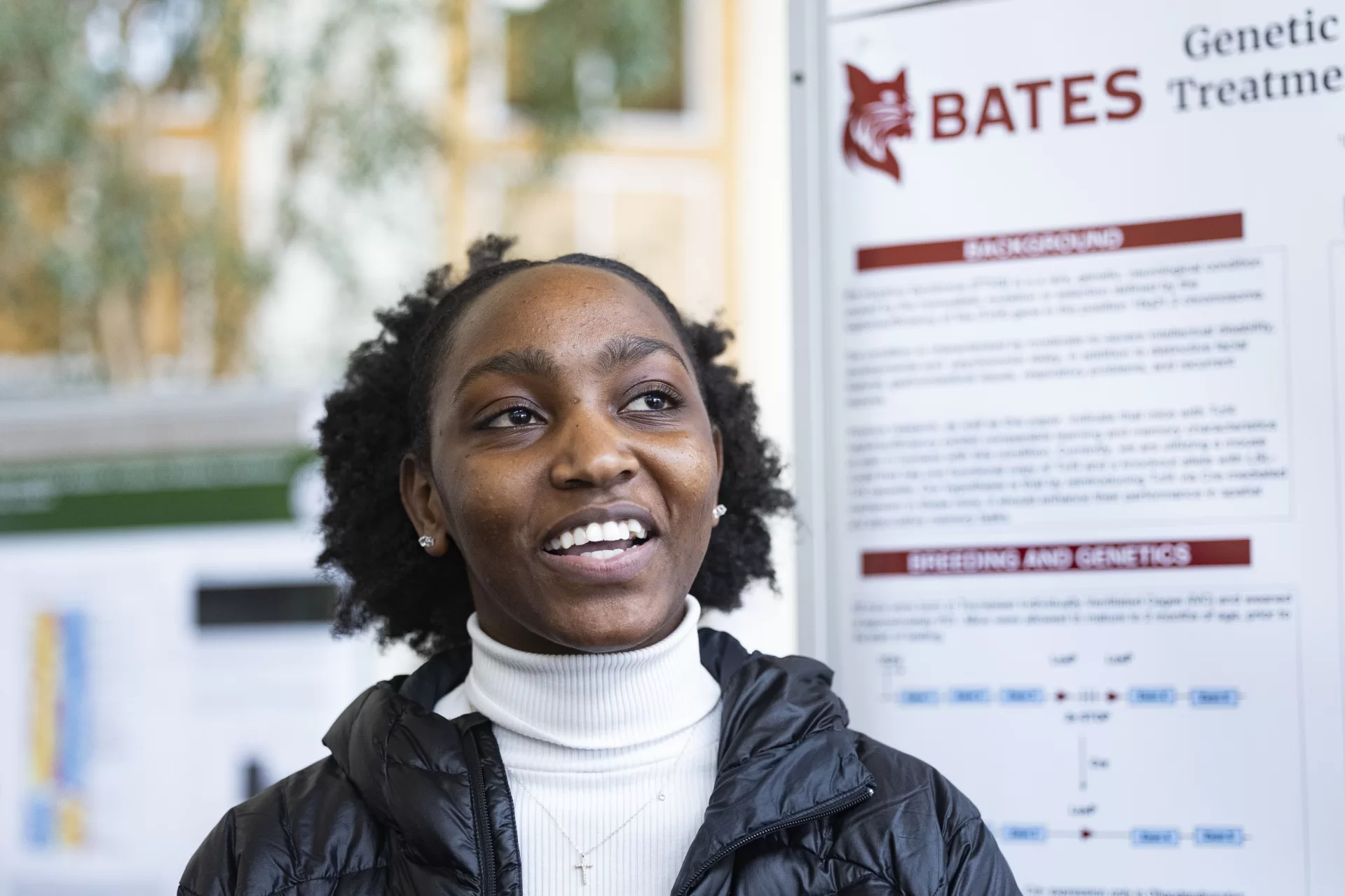
A genetic and neurological disorder, Pitt-Hopkins Syndrome has profound impacts on intellectual development and cognition, mobility, breathing, digestion and other functions.
Her thesis was advised by Andrew Kennedy, an associate professor of chemistry and biochemistry.
1:35 p.m. Welcome, all!
In a new twist this year, official greetings to the Mount David Summit were offered in the eight languages (besides English) taught at Bates.
Here, Assistant Professor of Classical and Medieval Studies Mark Tizzoni offers greetings in Latin.
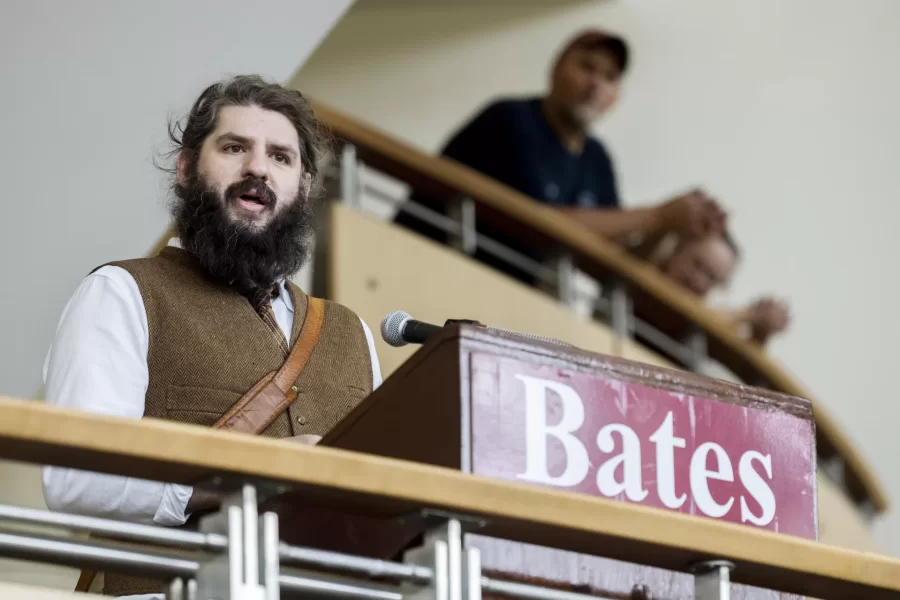
Joining Tizzoni were student Saliha Gomna ‘23 (French) and faculty colleagues Andrea Trumble (Spanish), Hongyu Zhang (Chinese), Keiko Koneda (Japanese), Raluca Cernahoschi (German), Marina Philopovi (Russian), and Laurie O’Higgins (Greek).
Each fashioned a greeting in their language that said, “Dear colleagues, students, staff, professors — all who have helped prepare this inspiring day dedicated to our academic lives. Welcome to the Mount David Summit of 2023!”
1:47 p.m. Staphylococcus epidermidis, take two!
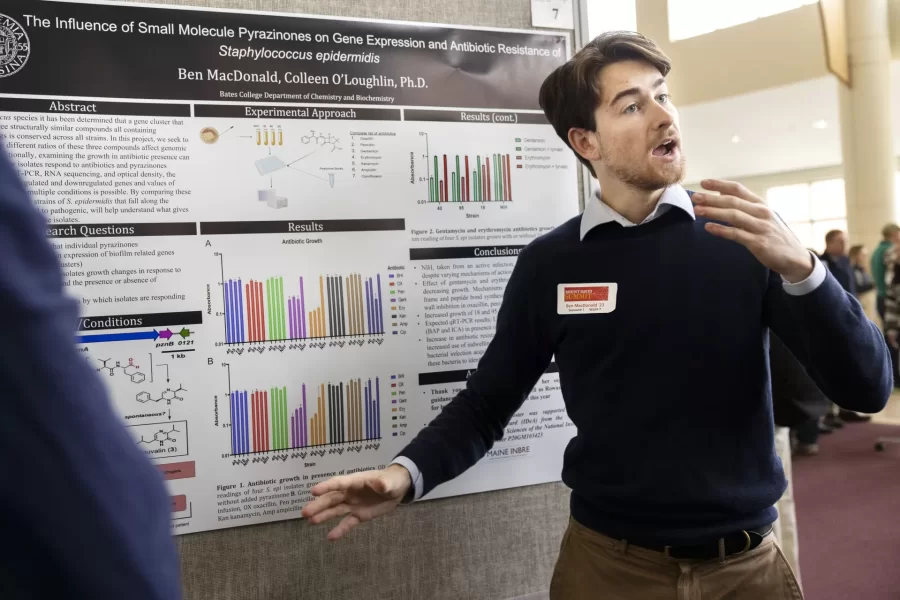
As Paige Cote did at 1:26 p.m., Ben MacDonald ’23 of Naples, Fla., a biological chemistry major, talks about the bacterium Staphylococcus epidermidis.
He looked at “The Influence of Small Molecule Pyrazinones on Gene Expression and Antibiotic Resistance of Staphylococcus epidermidis,” advised by Colleen O’Loughlin, an assistant professor of chemistry and biochemistry.
Pyrazinones are components of a range of natural substances.
1:53 p.m. Hard facts
Students at the summit often stand side by side, if not back to back, as they present their research to listeners.
Here, Alicia Meshulam ’23 of Lexington, Mass., a biological chemistry and French double major, presents her thesis research poster next to Will Schinabeck ’23 of Shaker Heights, Ohio, a biological chemistry major who looked at hard cider for this thesis research.
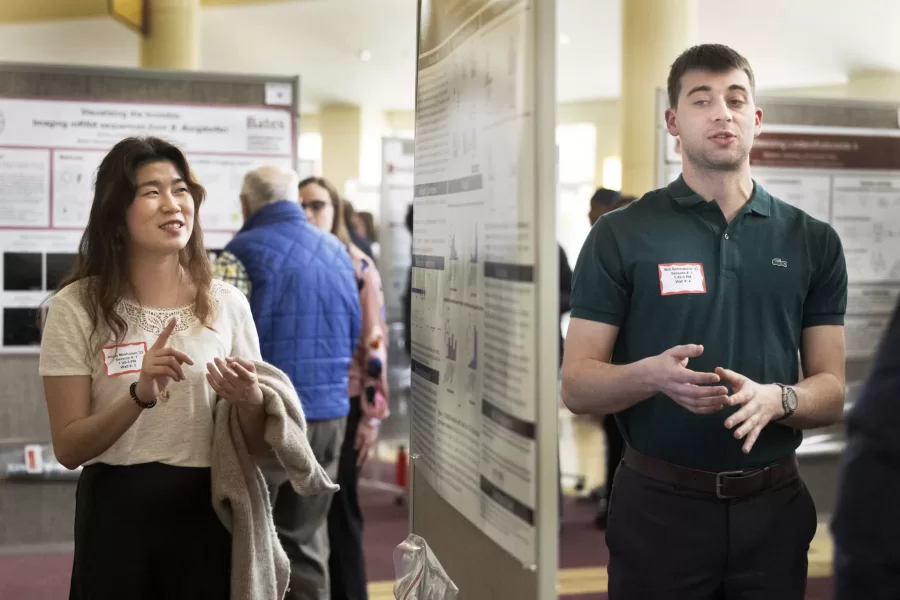
A decade after commercial manufacturers got into the business, hard cider is still in vogue, and this academic year Schinabeck learned a lot about the fermented alcoholic beverage.
The research he presented, “Novel Methods for the Characterization of Hard Cider,” takes a deep dive into new and inexpensive means of effectively (and accurately) characterizing levels of tannin and sugar in hard cider.
His methods are precisely the kinds of hacks that might come in handy for the home hard-cider “brewer,” the growing ranks of which include his adviser, Paula Schlax, the Stella James Sims Professor of Chemistry and Biochemistry. She supplied her student with artisanal cider made from wild apples to test his assaying methods on.
How does his professor’s home brewed hard cider taste? Schinabeck doesn’t know. One of the rules of his research is, let the science do the talking. “Tasting is subjective, you know.” In fact, he confesses to having limited experience drinking the juiced-up apple juice.
“Since turning 21 I’ve experimented with a couple of ciders, but I wouldn’t call myself a connoisseur.” Once he wraps up the science for Schlax though, he does plan to do some personal tasting research.
1:59 p.m. Rapt attention
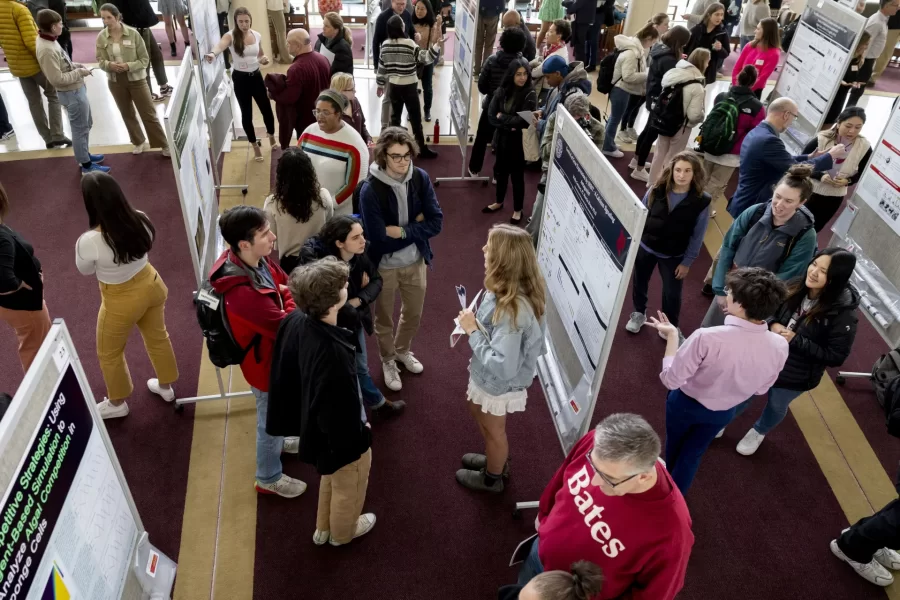
In the center, Molly Connors ’23, a biology major from Westwood Mass., captivates a group of students with her project, “Control of Gene Expression by a Calcium Signaling Antagonist,” advised by Martin Kruse, an assistant professor of biology and neuroscience.
2:04 p.m. ‘I’m going to Duke!’
Just 30 minutes before arriving to present her research, Emma Johnston ’23 made one of the biggest decisions of her life: which of three doctoral programs she would choose. “I’m going to Duke!” she announced.
That prompted a whooping cheer from several sophomore friends who’ve gotten to know Johnston, a biochemistry major from Bradenton, Fla., through their organic chemistry course, for which Johnston is a tutor.
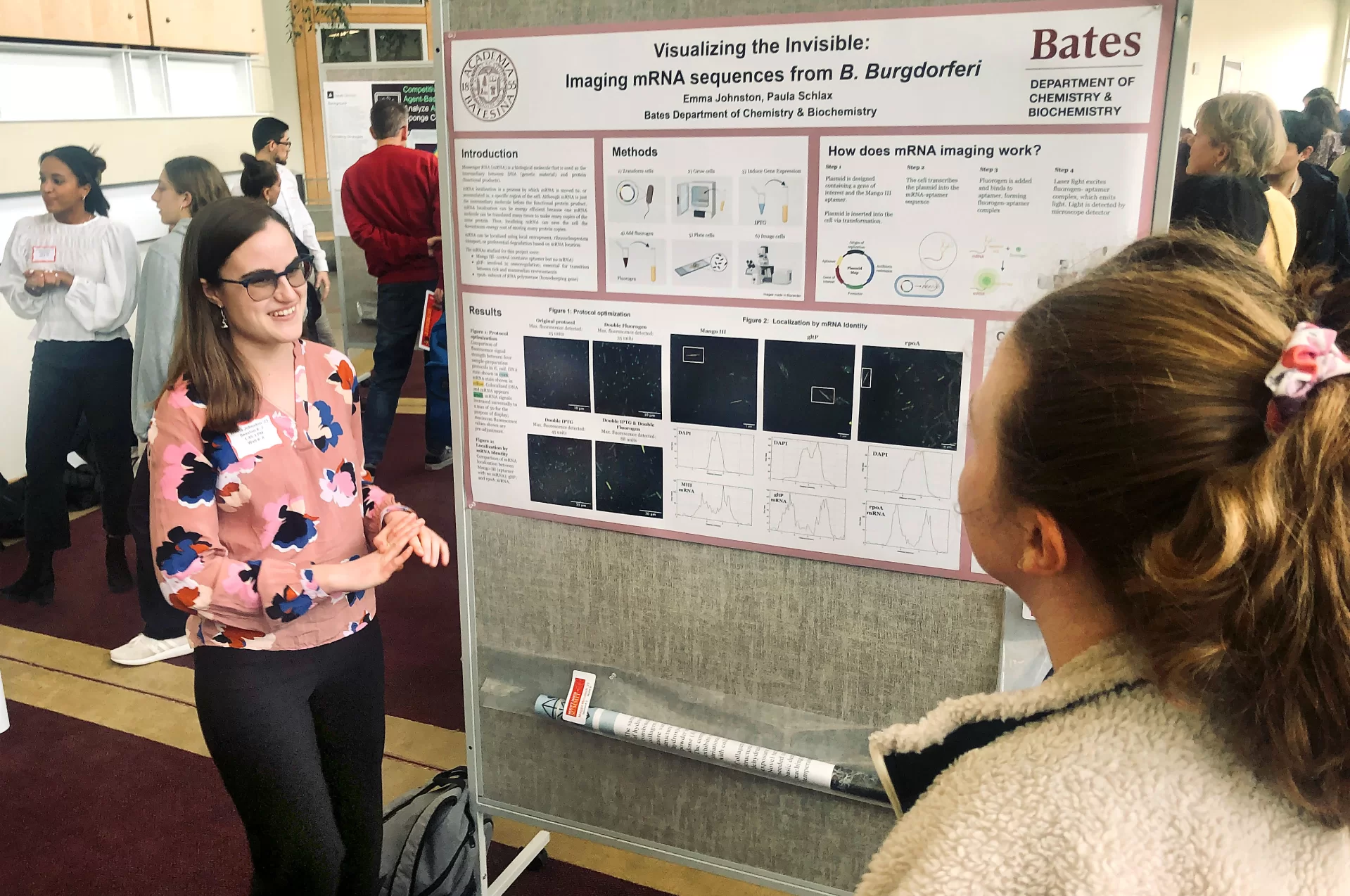
“This is so exciting — we’ve been really invested in her adventures,” said Kendall Jones ’25 of Plymouth, N.H.
Johnston will pursue microbiology at Duke. Explaining her choice, she says she was looking for something like her Bates experience, “a collaborative program. I love Bates’ collaborative network, and so it was really important to continue that. Duke’s molecular genetics and microbiology program is really exciting and they’re doing some cool research.”
Tutors like Johnston, explained Jones, “help teach us organic chemistry and they also give us advice. I was freaking out about something, and Emma was like, ‘Do you wanna get dinner?’ And she gave me suggestions for our lab. There’s a lot of leadership from the seniors like Emma.”
In turn, Johnston had praise for her adviser, Paula Schlax. Asked to describe Schlax in one word, Johnston wanted to give two. “Knowledgeable and supportive,” she said. “Those are two strengths that we value in academia, but sometimes we might see one or not the other. Paula has both.”
2:17 p.m. Family history
Erika Parker ’23 of Nipomo, Calif., a mathematics and German double major, presents research in a Pettengill Hall classroom that reflects on her German heritage.
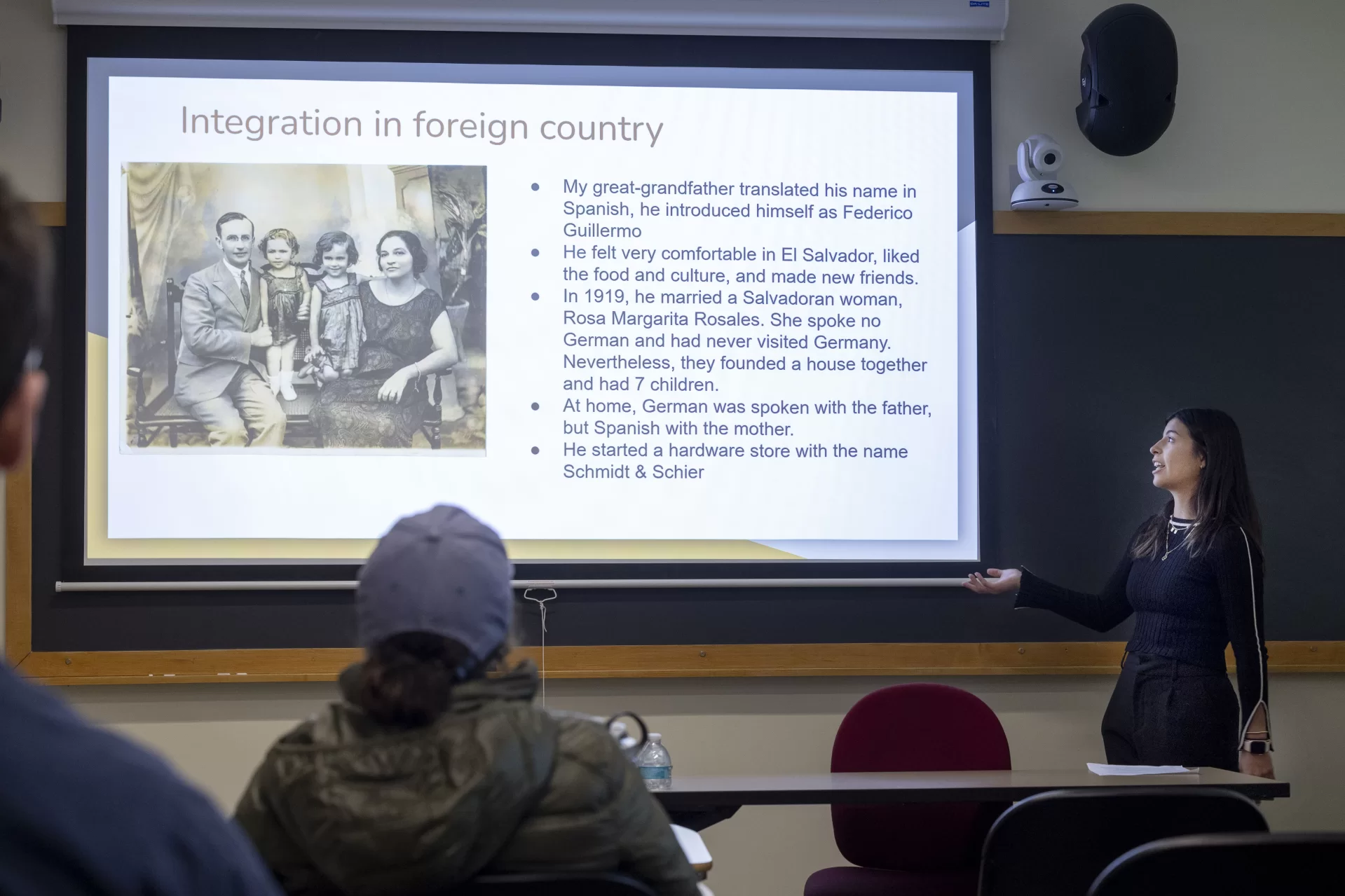
Her great-grandfather emigrated from Germany to El Salvador in 1912. Then he was exiled during World War II, ending up in a concentration camp in 1943. Then he was sent back to Germany.
Parker sought to understand “how he managed to find a home in an unknown place, which for him was El Salvador,” said Parker. Though she and her family live in California, “German characteristics and German culture have always been a part of our lives, and the German heritage has been passed down from generation to generation in our family.”
2:26 p.m. Down the rabbit hole
Dan Mills, director of the Bates College Museum of Art and a lecturer in the humanities, leans in to hear Emma Blakslee ’23 of Vail, Colo., talk about her research in biology.
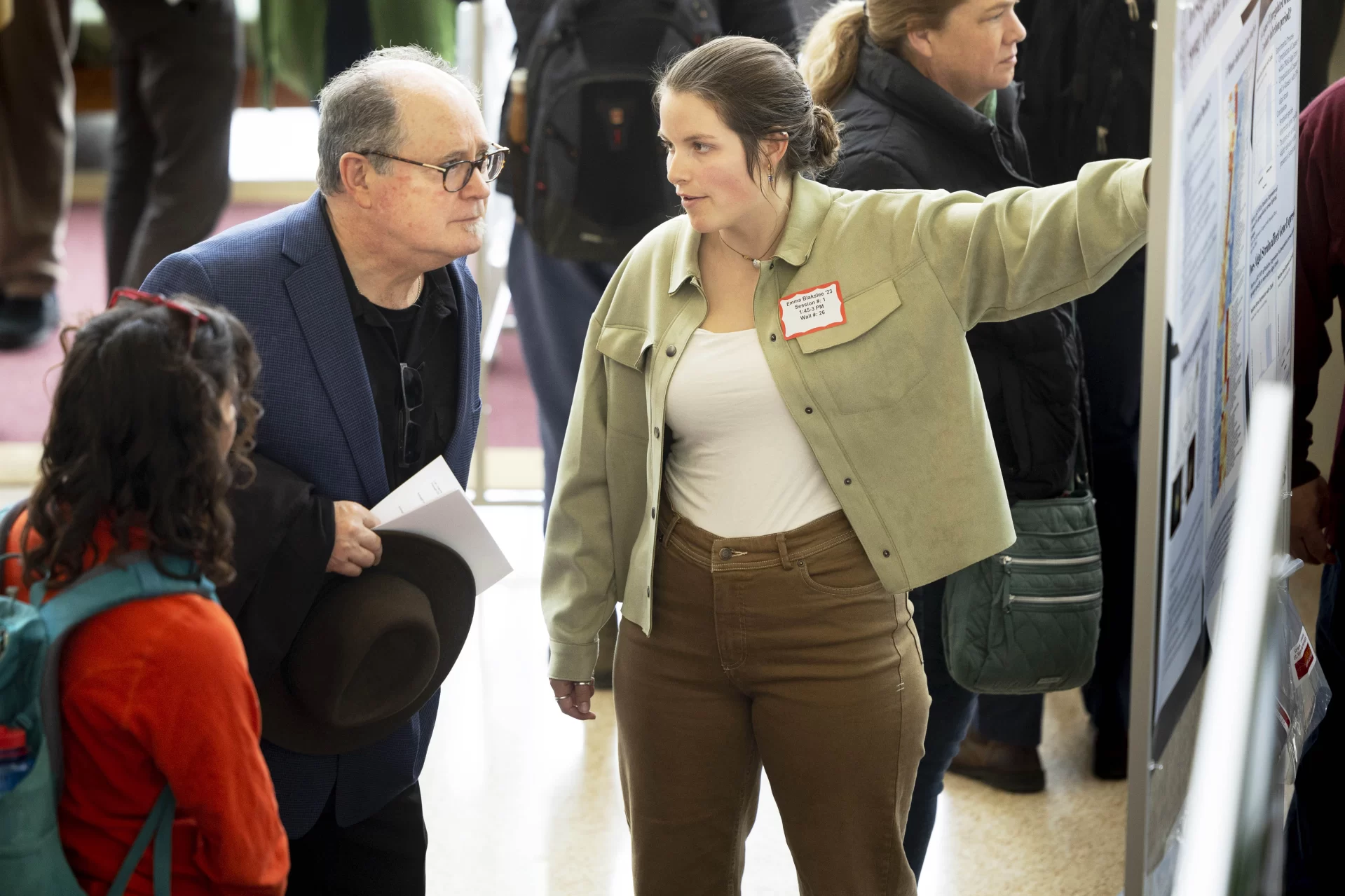
Blakslee likes rabbit holes. Less like the kind inhabited by fluffy bunnies, and more like the Alice in Wonderland kind, where one thing leads to another, and suddenly she finds herself zoomed in on something that may seem very tiny, but has far-reaching effects.
Like microalgae, which has many real and potential applications, including biofuels. But growing microalgae is expensive, partly due to the perceived need to remove bacteria, explains Blakslee, whose research was advised by April Hill, the Wagener Family Professor of Equity and Inclusion in STEM at Bates.
“A lot of labs remove bacteria when they grow algae,” she explains. “They put a ton of time into purifying it.”
Blakslee wonders if that’s necessary. So she investigated two microalgal strains that grow in freshwater sponges found in streams and rivers near campus. Among other things, she looked at their microbiome, all the bacteria and other organisms that naturally live on and in us. “Like how we need bacteria in our guts and every part of us to make [our bodies] work.”
In terms of whether the presence of bacteria affects the growth of microalgae, “I showed that microalgae grow as fast or faster in cultures with bacteria as those cultures without bacteria.”
“We’re just learning all the ways that bacteria can actually be really good for us and good for our ecosystems.”
2:10 p.m. Diapers and data
Just a few feet away, Sophie Martens ‘23 of Scarborough, Maine, explains to her mother and another listener about her project, “Inpatient Strategies to Reduce Food and Diaper Insecurity in the Pediatric Hospital Medicine Setting: A Quality Improvement Project.”
“Food and diaper insecurity can have harmful health impacts for kids,” said Martens. At the Barbara Bush Children’s Hospital in Portland, Maine, Martens designed a process where patients were given a questionnaire assessing their access to food and diapers. Then they were connected with the resources and social help they need.
As a biology major, Martens is interested in the collaboration of public health and medicine; after graduation, she’s headed to Tufts University School of Medicine.
Martens’ work is also traveling beyond the Mount David Summit. The hospital is taking her research to several conferences, including the American Academy of Pediatrics conference in Washington, D.C.
3:23 p.m. Taking a breather
Ali Manning ’23 of Sydney, Australia, a double major in politics and in rhetoric, film, and screen studies, sits for a moment with her parents, Mary and Christopher Manning, in Perry Atrium.
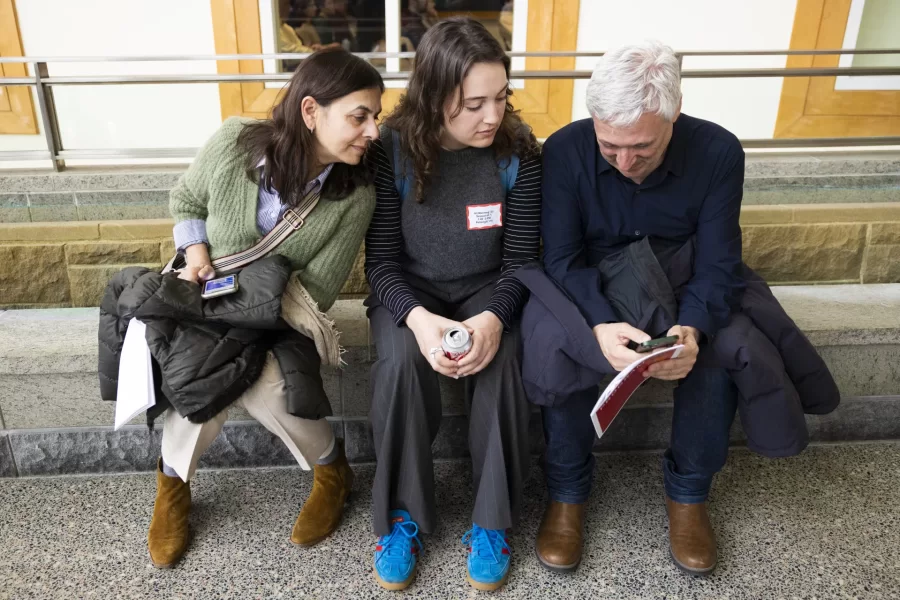
Manning had just presented her research, “Addicted Women,” during a panel discussion. Her work explores the relationship between womanhood, motherhood, and addiction. Her research was advised by Stephanie Kelley-Romano, a professor of rhetoric, film, and screen studies.
3:27 p.m. Atoms are chill, too
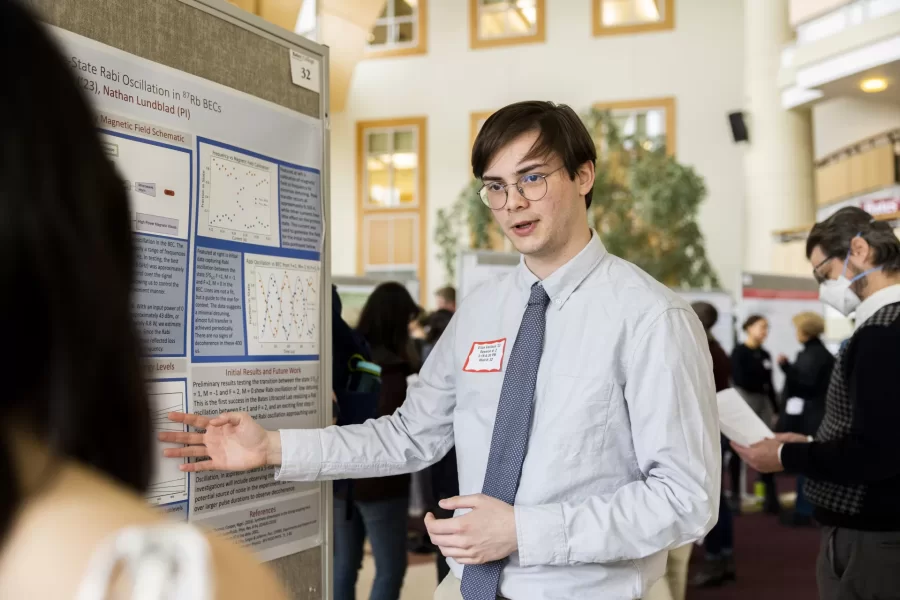
Elias Veilleux ’23, a physics major from Orono, Maine, presents his poster, “Generation of Five-State Rabi Oscillation in Rb-87 Bose Einstein Condensates.”
He works in the lab of Professor of Physics Nathan Lundblad, one of a handful of U.S. scientists who’ve been selected by NASA to mount research projects on the International Space Station’s Cold Atom Laboratory.
The term “Bose-Einstein condensates” in the poster title refers to what happens when a cloud of atoms become ultracold — near absolute zero, that is. The atoms slow down — way, way down — until they come together in a blob, or clump, known as a Bose-Einstein condensate.
3:41 p.m. Mapping the conversation
Sokona Mangane ’23 of Brooklyn, N.Y. discusses her poster, a striking visual presentation of the conversations taking place in society around inclusive teaching, and how concepts of inclusive teaching have changed over time.
Advised in her research by Associate Professor of Digital and Computational Studies Carrie Diaz Eaton, Mangane searched papers on CourseSource, an open-access journal of teaching resources, for words related to diversity, equity, and inclusion.
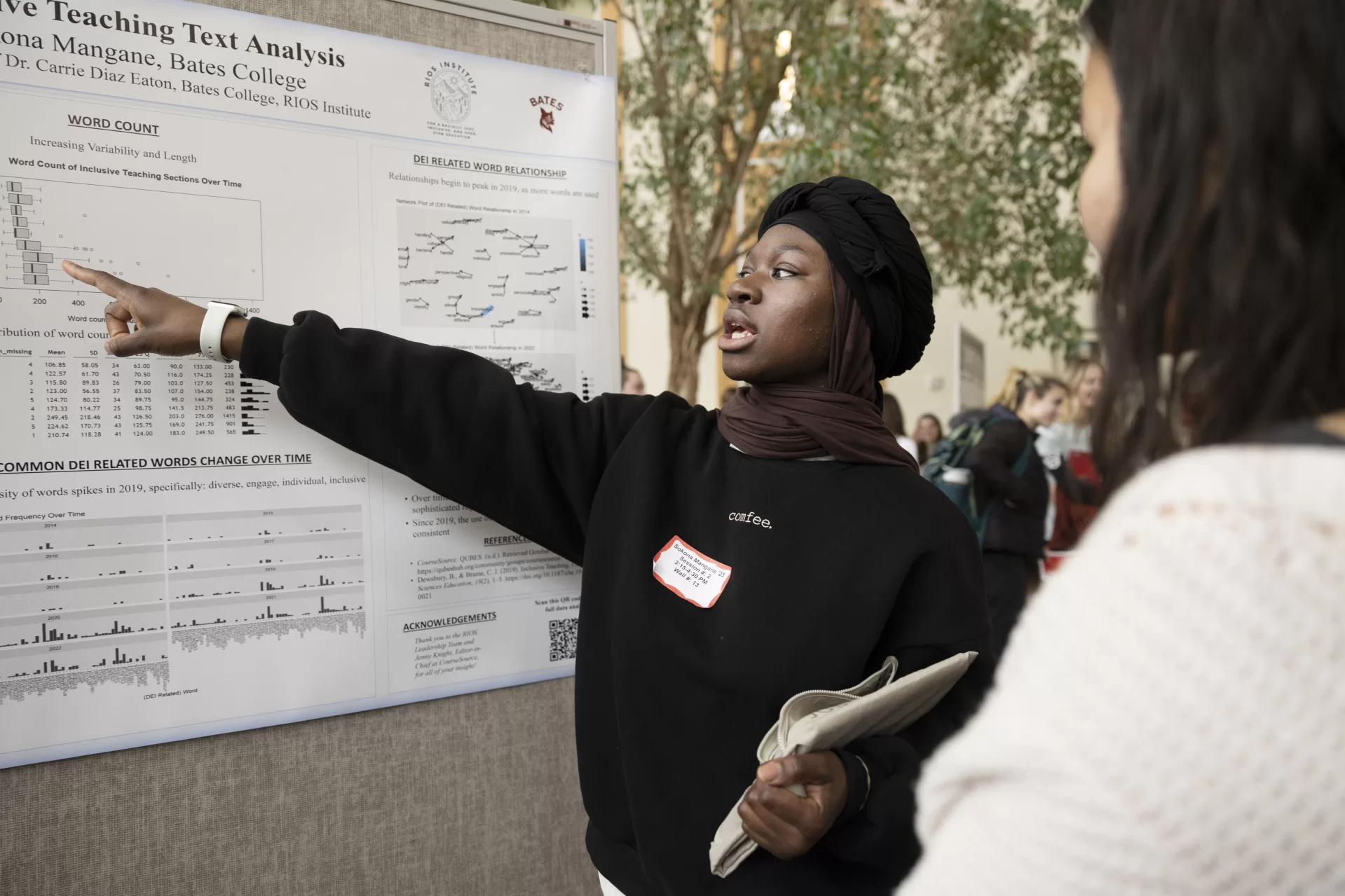
Nine years ago, the most common words were “diverse” and “diversity.” By 2019, the conversation had become more complex. More and different words entered the DEI and teaching conversation, which means “people are talking more,” says Mangane.
Her research poster shows a map of DEI-related words she found in papers from 2014, all clearly readable, and another from 2019, with so many interconnected words it’s like pepper spilled on the poster.
A mathematics major, Mangane said that presenting data visually really makes the project fly. “It seems to have more of an impact on the people seeing it.”
3:51 p.m. Some friendly support
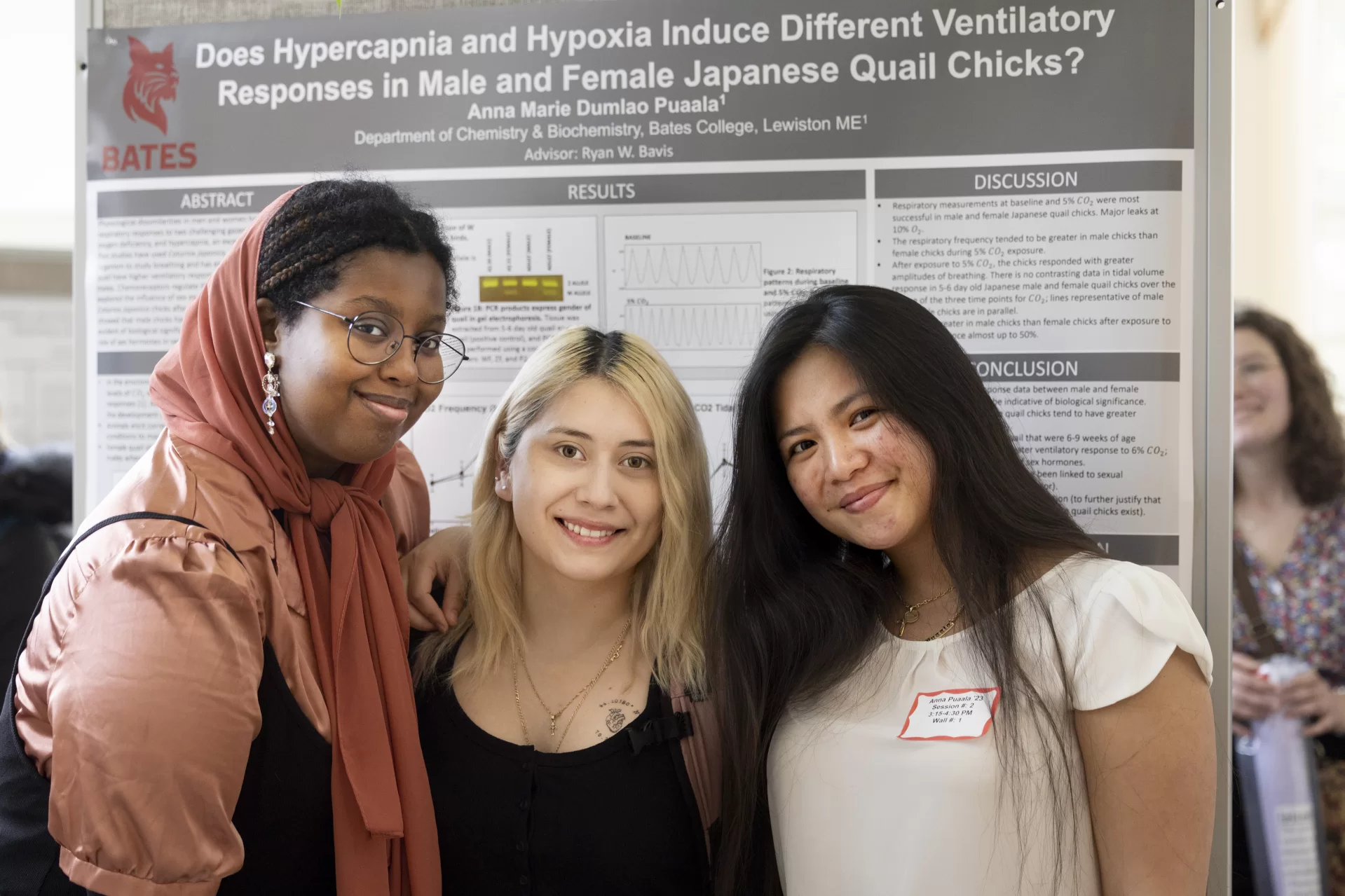
Biological chemistry major Anna Puaala ’23 (right) of Honolulu poses with Imti Hassan ’23 (left) of Portland, Maine, and Luz Rubio Vazquez ’23 of Houston in front of Puaala’s poster.
Puaala’s project was titled, “Does Hypercapnia and Hypoxia Induce Different Ventilatory Responses in Male and Female Japanese Quail Chicks?”
The terms “hypercapnia” and “hypoxia” describe the levels of oxygen and carbon dioxide in the blood. The former refers to abnormally high levels of carbon dioxide, and the latter to a decrease or less than the normal amount of oxygen. She was advised by Ryan Bavis, Helen A. Papaioanou Professor of Biological Sciences.
3:35 p.m. Making a beeline
At the summit’s annual literary readings by creative writing majors, Lucie Green ‘23 of Pittsburg introduced her three-part, tongue-twisting poem “Bee Spelling” to the crowd in the Keck Classroom.
“This is partly inspired by my love of The New York Times Spelling Bee game,” Green said. “And also my love of vocal theater warmups and listening to people do vocal theater warmups.” (Green is a double major in English and theater.) Another inspiration, she said, was a quote from C.S. Lewis’s book A Grief Observed: “The death of a beloved is an amputation.”
The Lewis quote provides the poem’s structure. Part one, called “Amputation,” spun off the letters of “amputation,” part two took on the letters of “beloved” and part three, “Death,” presented here, was constructed from “the dead.”
The deed ahead
Heated hate
Added a heat
Eat the head
Date the teeth that heated the hate
That ate the dead ahead of the deed
Eat the tea
Teed the heat
The hated eight
Add the data
Dead the dated
Heed the head
Her audience went wild with yelps and a chorus of snapping fingers.
3:55 p.m. Swamped with success
Most students are understandably apprehensive about presenting their poster research, wondering if it will be well-received. Caleb Ireland ’23 already knew.
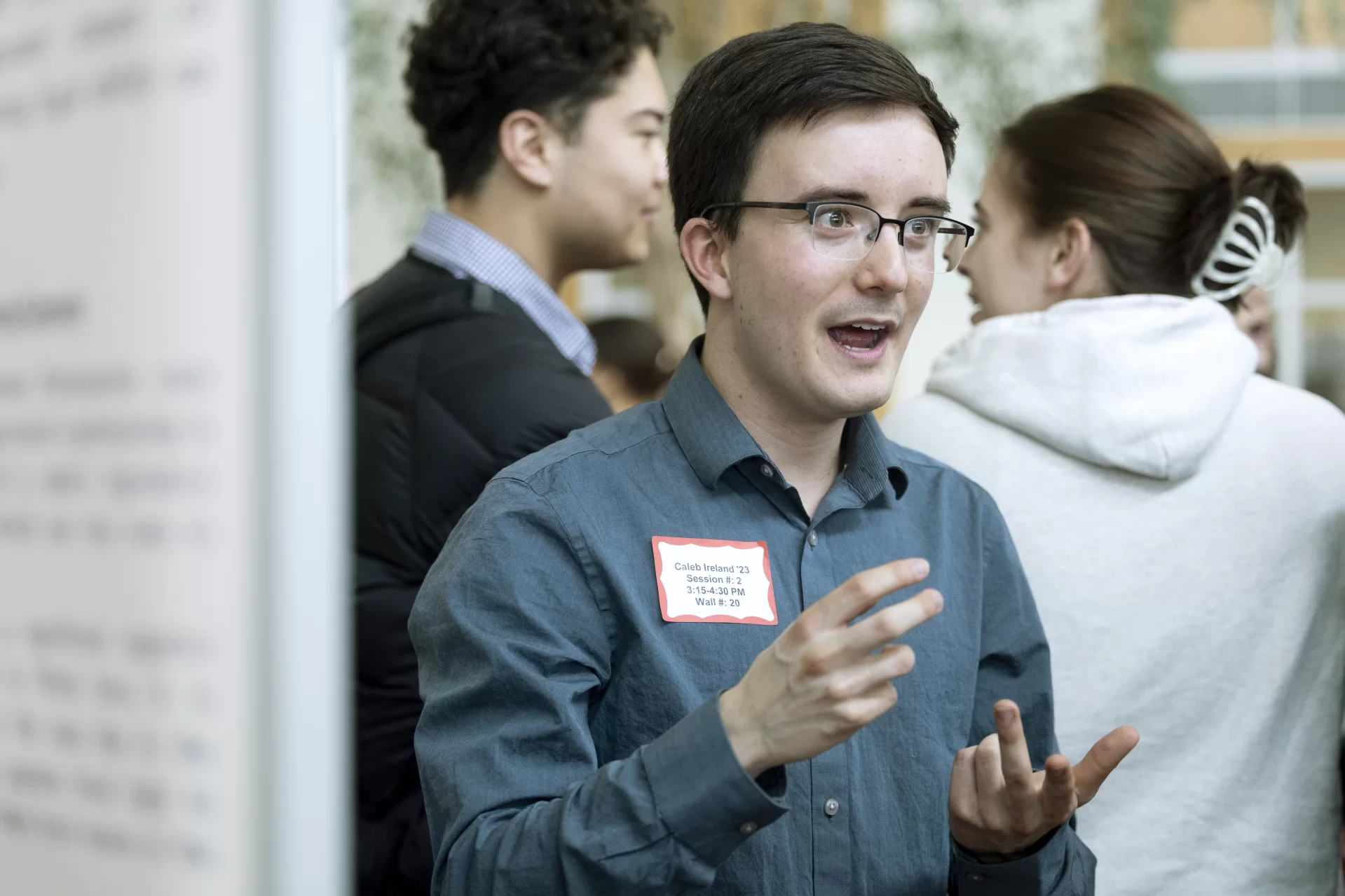
Not only was Ireland invited to present his poster research at this year’s American Society for Environmental History conference, but he won the award for most effective poster by an undergraduate presenter.
An environmental studies major from Amherst, Mass., Ireland is completing his senior thesis on the Great Dismal Swamp, which stretches across southeast Virginia and northeast North Carolina.
In the years before the Civil War, the swamp became a refuge of resistance for Indigenous, African, and African American people escaping slavery and settler colonialism. Ireland’s thesis is advised by Joseph Hall, an associate professor of history.
4:48 p.m. Galactic achievement
Brandon Villalta Lopez ’25, a physics and neuroscience double major from Managua, Nicaragua, presents his research project to an audience in Pettengill classroom.
At the summit, Lopez, shown at left with his adviser, Associate Professor of Physics Aleksandar Diamond-Stanic, were awarded the inaugural Kerry A. O’Brien Joint Ventures Award. Named for the recently retired assistant dean of the faculty, it recognizes collaborative work by a student and adviser “of the highest quality.”
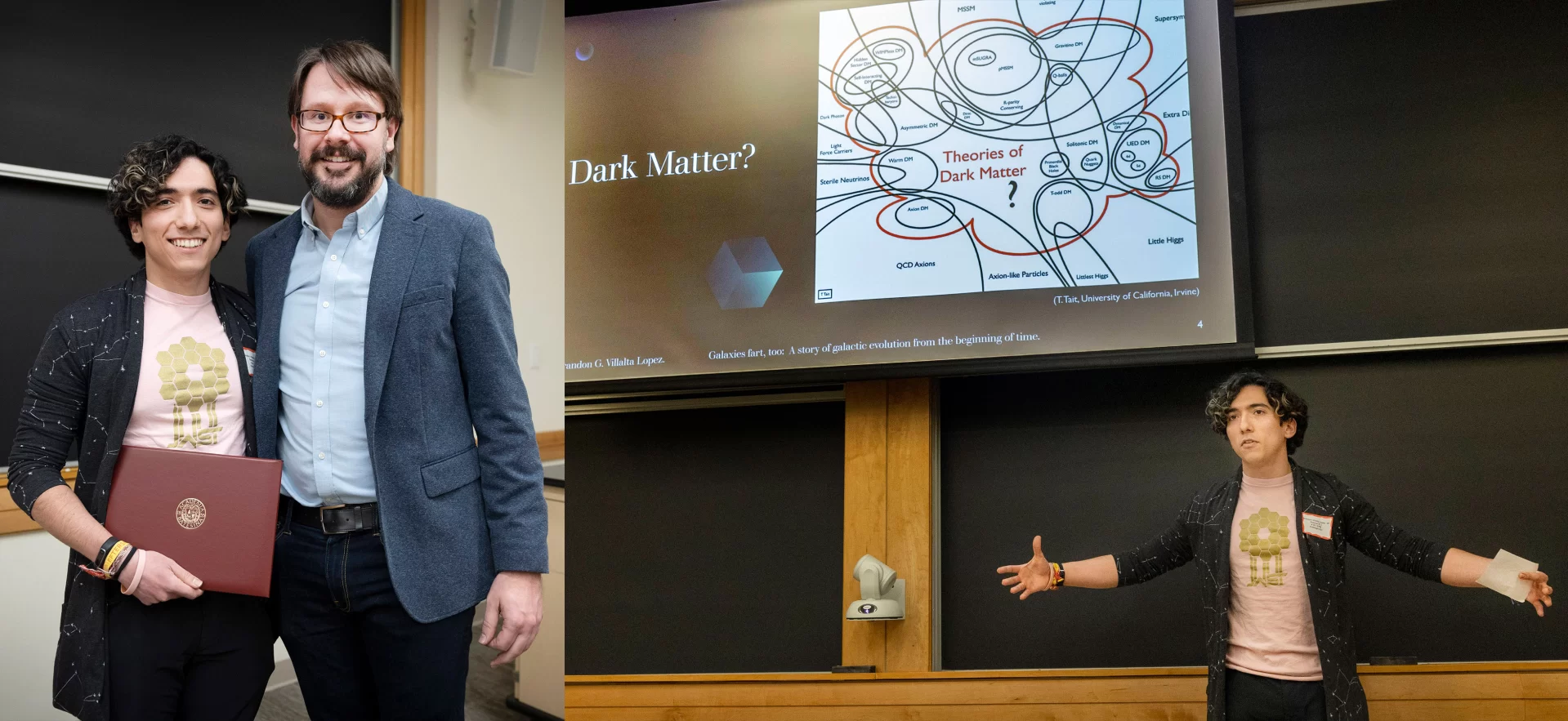
Diamond-Stanic runs the Bates Galaxies Lab, where students like Lopez join research that looks at galaxies and their properties to better understand galactic evolution. Along the way, Lopez has found a mentor in Diamond-Stanic. “As a neurodivergent, queer, Latinx student, it can be challenging to feel like I belong in a field like astrophysics. But this experience, and Aleks’ support and mentorship, have empowered me as a scientist.”
